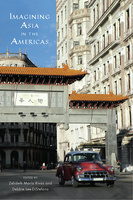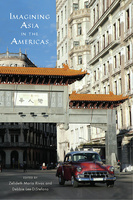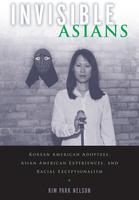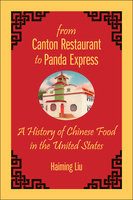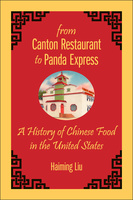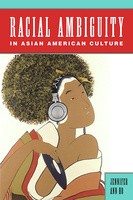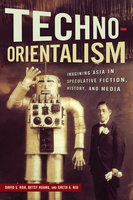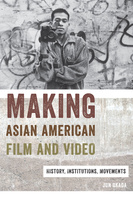Showing 11-20 of 20 items.
Imagining Asia in the Americas
Edited by Zelideth María Rivas and Debbie Lee-DiStefano
Rutgers University Press
Imagining Asia in the Americas investigates the myriad ways that Asians throughout North and South America use language, literature, religion, commerce, and other practices to establish a sense of community and negotiate between their native and adopted cultural identities. Drawing from a rich array of source materials, including texts in Spanish, Portuguese, Korean, Japanese, Chinese, and Gujarati that have never before been translated into English, this groundbreaking work opens up a conversation between various Asian communities within the Americas and beyond.
Imagining Asia in the Americas
Edited by Zelideth María Rivas and Debbie Lee-DiStefano
Rutgers University Press
Imagining Asia in the Americas investigates the myriad ways that Asians throughout North and South America use language, literature, religion, commerce, and other practices to establish a sense of community and negotiate between their native and adopted cultural identities. Drawing from a rich array of source materials, including texts in Spanish, Portuguese, Korean, Japanese, Chinese, and Gujarati that have never before been translated into English, this groundbreaking work opens up a conversation between various Asian communities within the Americas and beyond.
Invisible Asians
Korean American Adoptees, Asian American Experiences, and Racial Exceptionalism
Rutgers University Press
In Invisible Asians, Kim Park Nelson analyzes the processes by which Korean American adoptees have been rendered racially invisible, and how that invisibility facilitates their treatment as exceptional subjects within the context of American race relations and in government policies, including immigration law. Park Nelson connects this invisibility to the ambiguous racial positioning of Asian Americans in American culture, and explores the implications of invisibility for Korean adoptees as they navigate race, culture, and nationality.
From Canton Restaurant to Panda Express
A History of Chinese Food in the United States
By Haiming Liu
Rutgers University Press
Historian Haiming Liu takes readers on a compelling journey from the California Gold Rush to the present, letting us witness both the profusion of Chinese restaurants across the United States and the evolution of many distinct American-Chinese iconic dishes from chop suey to General Tso’s chicken. Along the way, historian Haiming Liu explains how the immigrants adapted their traditional food to suit local palates, and gives us a taste of Chinese cuisine embedded in the bittersweet story of Chinese Americans.
From Canton Restaurant to Panda Express
A History of Chinese Food in the United States
By Haiming Liu
Rutgers University Press
Historian Haiming Liu takes readers on a compelling journey from the California Gold Rush to the present, letting us witness both the profusion of Chinese restaurants across the United States and the evolution of many distinct American-Chinese iconic dishes from chop suey to General Tso’s chicken. Along the way, historian Haiming Liu explains how the immigrants adapted their traditional food to suit local palates, and gives us a taste of Chinese cuisine embedded in the bittersweet story of Chinese Americans.
Race, Religion, and Civil Rights
Asian Students on the West Coast, 1900-1968
Rutgers University Press
Stephanie Hinnershitz reveals the unsung legacy of civil rights activism among foreign and American-born Chinese, Japanese, and Filipino students, who formed crucial alliances based on their shared religious affiliations and experiences of discrimination. Using archival sources that bring forth these students’ authentic, passionate voices, Race, Religion, and Civil Rights is a testament to the powerful ways they shaped the social, political, and cultural direction of civil rights movements throughout the West Coast, from Californian college campuses to Alaskan canneries.
Racial Ambiguity in Asian American Culture
Rutgers University Press
In Racial Ambiguity in Asian American Culture, Jennifer Ann Ho shines a light on the hybrid and indeterminate aspects of race, revealing ambiguity to be paramount to a more nuanced understanding both of race and of what it means to be Asian American. Ho argues that seeing race as ambiguous puts us one step closer to a potential antidote to racism.
Techno-Orientalism
Imagining Asia in Speculative Fiction, History, and Media
Rutgers University Press
To judge from many speculative fiction films and books, the future will be full of cities that resemble Tokyo, Hong Kong, and Shanghai, and it will be populated mainly by cold, unfeeling citizens who act like robots. Techno-Orientalism investigates the phenomenon of imagining Asia and Asians in hypo- or hyper-technological terms in literary, cinematic, and new media representations, while critically examining the stereotype of Asians as both technologically advanced and intellectually primitive, in dire need of Western consciousness-raising.
Techno-Orientalism
Imagining Asia in Speculative Fiction, History, and Media
Rutgers University Press
To judge from many speculative fiction films and books, the future will be full of cities that resemble Tokyo, Hong Kong, and Shanghai, and it will be populated mainly by cold, unfeeling citizens who act like robots. Techno-Orientalism investigates the phenomenon of imagining Asia and Asians in hypo- or hyper-technological terms in literary, cinematic, and new media representations, while critically examining the stereotype of Asians as both technologically advanced and intellectually primitive, in dire need of Western consciousness-raising.
Making Asian American Film and Video
History, Institutions, Movements
By Jun Okada
Rutgers University Press
Making Asian American Film and Video gives readers a unique behind-the-scenes look at the various institutions that have bankrolled and distributed the genre over the course of its fifty year evolution. Jun Okada explores how state-run media outlets like PBS served as crucial support for Asian American films, but also imposed limitations. In addition, she considers a number of Asian American filmmakers who have opted out of producing state-funded films, from Wayne Wang to Gregg Araki to Justin Lin.
Stay Informed
Subscribe nowRecent News

